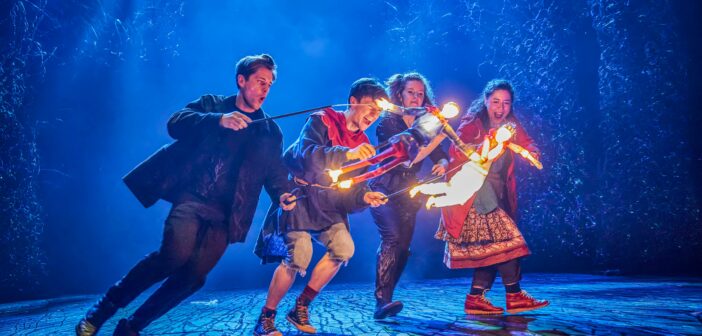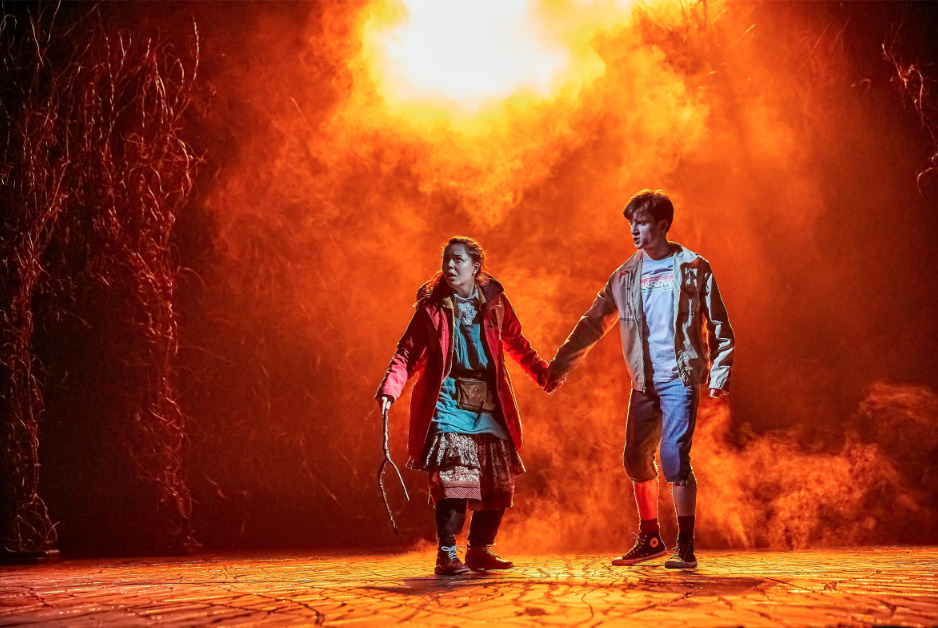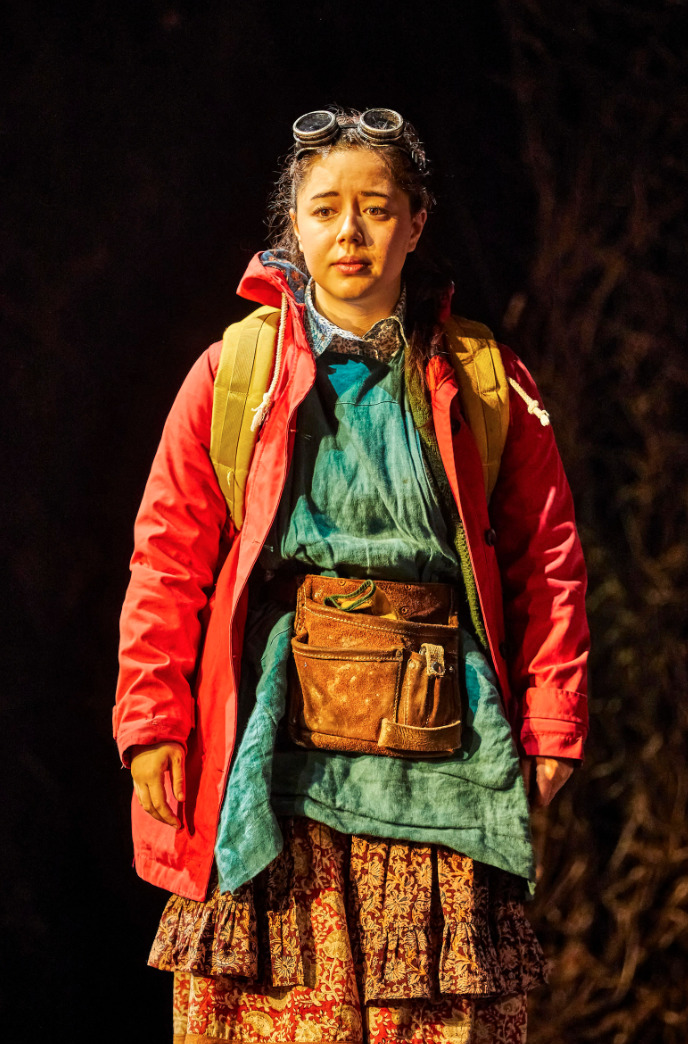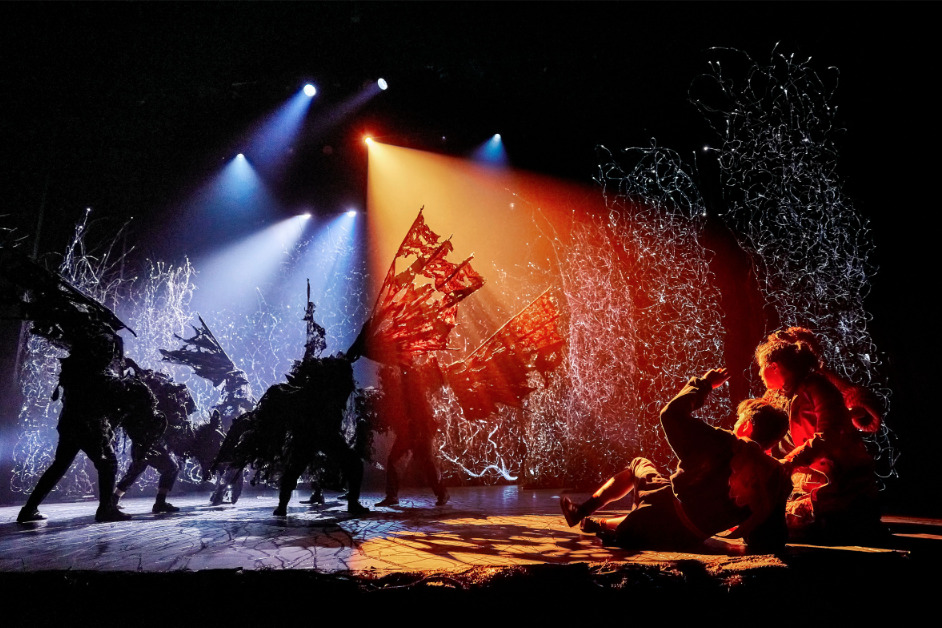Caught in a tidal wave of grief, toiled on a riptide of magic, and lulled on the waves of puppetry; The Ocean at the End of the Lane delights and heartbreaks in many different ways.
There’s a certain problem with adaptations on whether they can do “justice” to the product they’re based on. In the case of Neil Gaiman‘s much-loved and somberly moving, The Ocean at the End of the Lane, it would almost be impossible. So rather than trying to do justice, Joel Horwood’s script and Katy Rudd’s theatrical reimagining instead steps out of the shadow and promises to do its own thing. As a result, even when you know where this story will take you, the lows break just as hard as they did with Gaiman’s novel, and the highs leave an ever bittersweet after-taste that draws the play to a conclusion that has you wishing for more.
The story of The Ocean at the End of the Lane is, at the same time, both simple and complicated. To explain it in a short paragraph does a disservice to the richly layered characters, the complexity of the story, and the beauty it achieves. At its heart though is an unnamed protagonist, or “boy” (Keir Ogilv); his witty, playful, and often humorous new friend, Lettie Hempstock (Millie Hikasa); and the boy’s father, or “Dad” (Trevor Fox). As a general nuance, the story tackles themes of grief, memory, growing older, and recognising, most importantly, who we are as people. It juggles all these themes with excellency and unfamiliarity when recognising it as a work of Gaiman, but as he says in the program, “my wife likes emotions, while I tend […] to distrust them. But I put them into The Ocean at the End of the Lane, because I was writing it for Amanda [Gaiman’s wife].”
To bring life and dread to the characters of The Ocean at the End of the Lane is no small feat, and all the cast are masters of their craft. Ogilv is curious and at times fiery, characteristic of those final pre-pubescent days where a sense of wonder and magic still breathes into the world of imagination. Hikasa is equally so, although carrying a depth and maturity that bespeaks secrets, affection, and her own struggles that occasionally bubble to the surface. Fox carries his changing personality with ease, while Lettie’s mother, Ginnie (Kemi-Bo Jacobs), acts as the counterpart parent who’s often more stable. Both Fox’s and Jacobs’ characters as parents feel important in grounding the story’s many themes on adulthood vs childhood, and often lend ways to interesting parallels between the children they’re trying to nurture. Yet, weathering and often grounding the show is Old Mrs Hempstock (Finty Williams) and Ursula (Charlie Brooks). On opposite sides of the spectrum, both actors are often mesmerising, commanding audience’s attention, and weaving a sense of hope, love, fear, and dread (respectively) as they bring life and new meaning to liminal worlds and the boundaries of the world we think we know.
There are so many facets in Katy Rudd’s rendition of The Ocean at the End of the Lane that it would be impossible to mention them all. With elements of physical theatre, puppetry, original music, and so much more; Rudd’s direction is filled with nuance, beauty, splendor, and complexity that equals Gaiman’s story. Even while the adaptation initially struggles to charter the tested waters of exposition and character introductions in its opening minutes; when it strips away setup and launches into the magic and gravity of the narrative, Rudd’s adaptation finally weighs its anchor and sails strongly into a performance that’s jaw-dropping. Particularly memorable was the physicality of the ensemble, much more than a fancy way to change scenes, and instead a physical force that reacted to the story beats and changes in emotion. Likewise, the puppetry was on the scale of wonder and awe that only The Lion King or The Life of Pi stage adaptations has ever matched, used less frequently but to both horrifying and sometimes gleeful affect. In fact, the contraptions of its puppets, whether the hulking monstrosity of Skarthach, or the smaller puppets of the ocean, were the moments of the show that will forever be one of the theatre’s best moments.
Along the way, I had my gripes, but as I often find with theatre, it’s easier to forgive and forget when the show’s as compelling as The Ocean at the End of the Lane. Apart from an initial uneven start, every issue I could have had was eclipsed by the sheer success of its storytelling, acting and direction, and everything else along the way. Plus, as the first theatre show to make me feel a silent tear (or quite possibly tears) trickle down my cheek and to give me a literal chill, I’d be remiss to dissuade anyone from watching it if they have the chance.
So, as a final few words. Don’t think twice. Go see The Ocean at the End of the Lane, and see theatre done in a way that never stops surprising.
The Ocean at the End of the Lane is currently showing at The Mayflower Theatre from July 4th – July 8th. You can book tickets by clicking here. Check out the trailer below:







